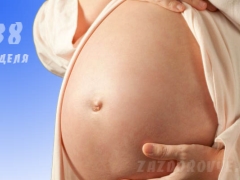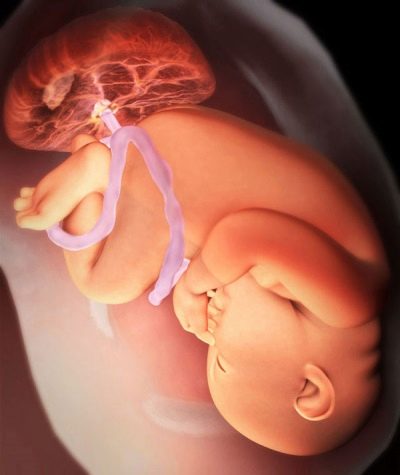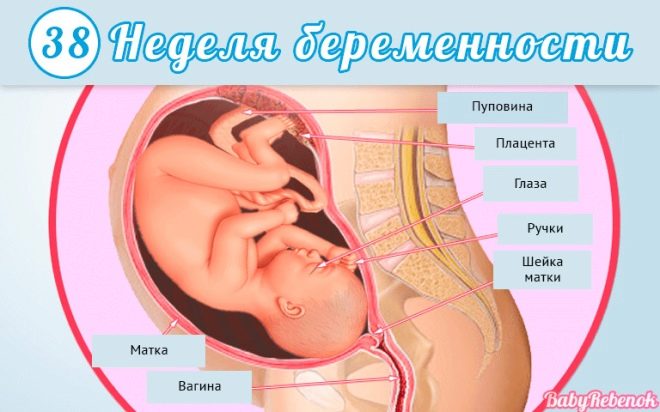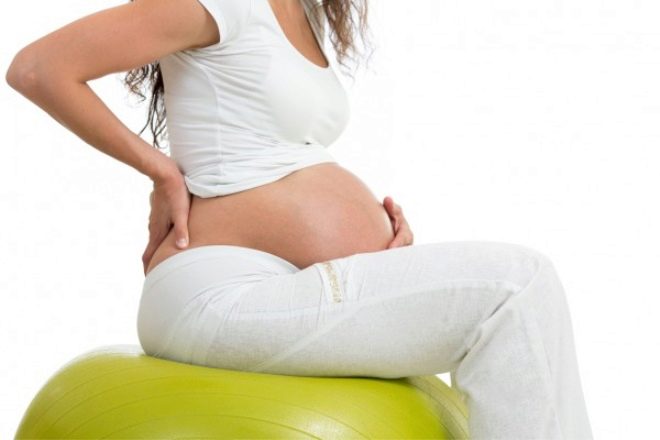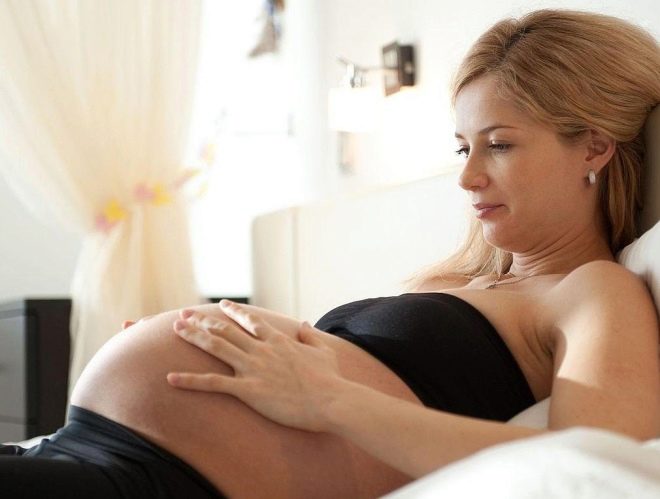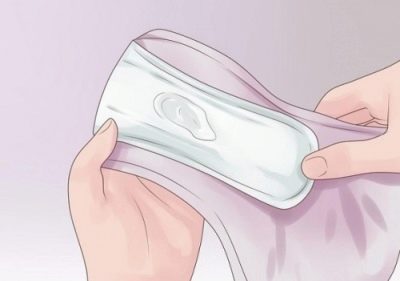38 week of pregnancy: discharge and pain in the abdomen
38 week of pregnancy - this is the final stretch. A baby can be born into the world at any time: this week or a little later. Considering how long the journey has been, it is not surprising that various painful sensations accompany this term almost constantly.
What is the term
The 38th week of pregnancy is nine and a half obstetric months, each of which lasts 4 weeks. Since obstetricians always add two weeks to the real (embryonic) period, now there is 36 weeks of the baby’s development. In the usual calendar sense, exactly 8 months and 2 weeks have passed.
Until the date that the doctors noted as the expected date of birth of the baby, remains a little more than two weeks, but this does not guarantee that the birth will take place on the day indicated by the doctor in the exchange card of the pregnant woman. The current 38th week is a very real deadline for the birth of the crumbs. The baby is ripe, he is developed enough to live in this world. Therefore, most women already have bags with things for the maternity hospital, and they have long been in the most visible place.
Physiological features of the week
Most pregnant women to 37-38 week, there is a feeling of constant fatigue. It becomes very difficult and difficult to wear the abdomen, because the uterus has already filled the entire abdominal cavity, and inside it is a baby who, in turn, does not leave free space inside the female genital organ. The center of gravity is changing, because of this, the load on the muscles of the back, on the lower back, rises. A big belly creates a lot of inconvenience when performing the usual daily actions: it is impossible for a woman to bend down, quickly change body position, walk for a long time or stand.
The uterus this week can squeeze the diaphragm with its bottom, which is why a woman will have shortness of breath and an obsessive feeling that she cannot breathe deeply. As the uterus descends, and in most women by this week it is already lower than before, due to the fact that the baby has assumed a “pre-launch” position: he rested his head on the exit from the pelvis.
Hormonal prenatal changes make a woman sensitive, emotional. Fear of what awaits in the generic process, again does not add calm. For this week, a small weight loss is considered completely normal, and if this happens, then the birth is just around the corner. Weight goes along with excess fluid, which previously accumulated under the action of progesterone. The production of this hormone before childbirth is reduced, and therefore the weight begins to decrease.
The placenta still copes well with its functions, but is already beginning to "grow old", thinning, which also makes its "contribution" to the mother dropping a couple of kilograms of weight. The volume of amniotic waters also decreases.
Increasingly, a woman is tormented by training bouts. The stomach, even if it is lowered, becomes hard from time to time. The crumb squeezes the nerve endings with his head, which can cause tingling of different intensity in the perineum. And at this time, and the next 38-39 weeks of gestation, the future mother can be plagued by rather pronounced pain in her stomach.
Abdominal pain
A variety of abdominal pain is now surprising in its quantity. However, not all of them are signs of the onset of labor and do not say that it is time to go to the hospital. Repeatedly, it is much easier to navigate in the "signals" of the body, but for those who are waiting for the first child, it is not easy, and every stretching and tingling seems to them a "long-awaited beginning."
False contractions
The first they can begin to feel women who are going to give birth for the first time. Multidote training bouts usually begin somewhat later, and sometimes - just a few days before the upcoming delivery. Such contractions help the uterine muscles to prepare for the test, which is coming very soon. If the birth is coming first, then this week training bouts are observed in about 95% of pregnant women.
False contractions from the real ones are primarily distinguished by the fact that they are not of a long-term nature and temporary regularity. They feel like nagging sensations, similar to those that the woman had previously experienced during menstruation. Slightly hurt the waist, pulling the lower abdomen. The uterus "becomes stone", and then, when the pull ceases, it becomes soft again.
If a woman lies down and takes a nap, or simply rests in a horizontal position, the false contractions will pass without a trace. The same cannot be said about true struggles, which are considered to be a sure sign of the onset of labor.
Far from all pregnant training fights cause unpleasant pain. There are some future mothers who feel only stifling in the lumbar region and ovaries.
Real fights
True contractions begin immediately before childbirth and are part of the generic process. The cervix is revealed, which is accompanied by contractions. The beginning of them resembles training bouts, but the advice to lie down so that “everything goes away” will not work here. Even in the resting position, the contractions will intensify, their frequency will increase, and the time between them will decrease. Painful sensations will also become more pronounced.
First, a woman may note that the tummy aches and hardens with the localization of pain in the lower abdomen. Then the uterus kamenet more and more, and the pain becomes encircling, the ache and pain no longer only the lower abdomen, but also the loins and back. Pulls the waist more and more. "Stone" belly means that the uterus comes in tone, stiffens. This happens at the peak of the contraction, then the muscles relax, the woman feels relieved.
First, contractions usually last no more than 30 seconds, repeated every 10-15 minutes. In this stage, a woman who is going to give birth for the first time can stay up to 8 hours or even more. The cervical dilatation will be only 3 centimeters.
The second stage is the duration of contractions for a minute or more with a repetition every 4-5 minutes or more. This period lasts less than the first, and therefore it is desirable for a woman to already be in the hospital under the supervision of doctors.
The third stage preceding the attempts is the shortest. The contractions are repeated in about half a minute and last up to 90 seconds each.
The question of when to go to the hospital, is not easy to answer. Primiparous woman can not rush much, because she has the first stage of true contractions longer than the future moms who have ever had to give birth.
If the childbirth is repeated, then you should go to the hospital immediately when regular contractions, unlike training ones, appear. It is usually considered that an obstetric institution, regardless of the number of previous births, needs to arrive with contractions every 7-10 minutes.
Digestion
Since the physiological peculiarity of this week is such that the internal organs are pressed by a large and heavy uterus, in late periods abdominal pains sometimes have no relation to childbirth, but are associated exclusively with motility disorders, intestinal disorders, and bile flow disorders. These pains are manifested as cutting or tingling in the lower abdomen, the stomach “twists”, and it can also be hard. Changes in the position of the body can cause increased pain, while the stomach often seethes. Not excluded loose stools or constipation, nausea, vomiting.
Abdominal pains that occur at week 38 due to the disruption of the digestive organs, are accompanied by feelings of strong intestinal distention, distention. Most often, the pain is observed in the iliac region, after defecation may increase. It is this suspicious and impressionable future mothers who are often perceived as a precursor to childbirth.
A small percentage of women do not experience pain at week 38 at all. They usually have high compensatory abilities, thanks to which the organism continues to work without interruption even in extreme conditions.
Allotment
Discharges by the end of pregnancy are always different. To help a woman in time to orient in a situation called “panty liners”. They will not allow to miss the moment when it is time to go to the maternity hospital or need urgent medical consultation. What can be said about the selection at this time:
- Norm. The fact that a woman is fine, they say light, white or yellowish discharge, which have a weak sour smell or no odors at all. The amount of discharge depends on the hormonal background, but in general it is assessed as moderate.
- Mucous discharge. If a woman paid attention to the fact that the discharge became mucous, it could indicate a cork discharge, which during the entire pregnancy tightly closed the cervical canal from penetration of foreign bodies, bacteria, viruses into the uterus. The stopper can move away entirely as a clot of mucus, transparent with streaks of blood. Sometimes the cork moves off gradually. In this case, the mucous discharge lasts several days, they may be noticeable brownish or pink streaks of blood.
Cork discharge is a sign of the onset of labor. A woman should, without too much panic, calmly gather things and go to the obstetric institution. After the beginning of the discharge of the stopper, a hot bath, sex and douching are contraindicated.
- Watery discharge. Such secretions may indicate a discharge of amniotic fluid. As in the case of a stopper, the amniotic fluid can withdraw completely or flow in parts. Full discharge usually raises no questions. If the water is gone - it's time to go to the hospital. If a woman notices that there is more discharge, and they are watery in nature, then it can be a matter of leakage. The actions of a woman in this case should also be sent for early hospitalization. Dribbling is a danger to the baby. Sometimes such a watery discharge has a greenish tint. If such secretions are noticed, it is urgent to go to the maternity hospital, because it is possible that meconium is present in the leaking waters - the original feces from the intestines of the fetus.
Usually he goes outside after the birth of a child. But in the case when there is a Rhesus conflict, the child experiences hypoxia, with entanglement, placental insufficiency, defecation may be premature: right in the womb. Such a situation is the basis for urgent delivery.
- Brown and pink discharge. The secretions of brown, as well as pink, if they are not associated with mucous secretions and are not a sign of cork discharge, can speak about blood impurities. The reasons can be quite a lot: from problems with the placenta to pathological changes in the cervix. Be sure to report bleeding to the doctor.Although the birth is already very close, there should be no blood in them.
- Saturated yellow or greenish discharge. Such secretions may indicate that a woman has an infection of the genital tract. Inflammatory and suppurative inflammatory process can be caused by bacteria and fungi.
Usually, a change in the nature of the discharge occurs simultaneously with the appearance of unpleasant sensations in the area of the external genital organs - itching and burning appear. Discharges have an unpleasant odor, often foaming. Consultation with a doctor is compulsory, since it is necessary to sanitize the genital tract before childbirth, otherwise the child runs the risk of infection.
Discharge after medical examination
If, at the 38th week of pregnancy, after a medical examination by a doctor, a brown discharge appears, then this is considered normal. Panic and worry not worth it. The mucous membranes of the genital tract under the action of hormones become more loose and vulnerable, and therefore examination of the cervix may well provoke the appearance of bleeding. Usually they pass within a few hours after returning from a consultation.
If, during the examination of the uterus, the doctor provoked the discharge of the remnants of the mucous membrane of the stopper, which will appear as discharge after the examination, then labor will begin soon. Again, do not panic, you just need to be fully prepared.
Reviews future moms
At this time, the sensations of women are quite similar. Many note fatigue and heaviness in the abdomen, frequent urination. The control over excretions and painful sensations is carried out by all pregnant women, because the understanding that the child can “be prompted” outside at any moment does not disappear even for a minute.
Many this week are starting to complain that childbirth does not occur for so long. Expectant mothers want to give birth more quickly and feel themselves light and mobile again.
About what happens to mom and baby at 38 weeks gestation, see the following video.
